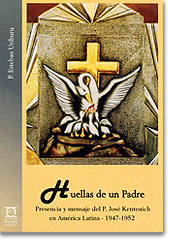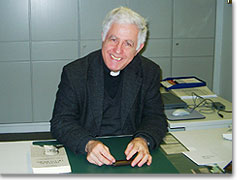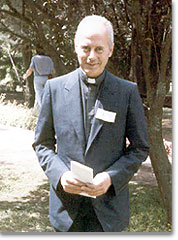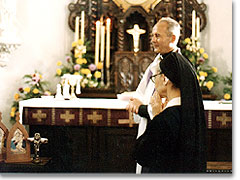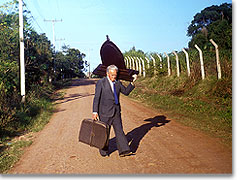SCHOENSTATT, Antonella Cerini. "A few weeks before he died, he called
me and told me: Angel, take care of India. I worry a lot about those
people. See to it that India knows Schoenstatt," relates Father Strada.
Surprising! In the proximity of heaven, Father Esteban is still keeping
an eye on his desire that Schoenstatt comes forth in India. Today, we
know that this mission is underway with Schoenstatt Sisters of Mary
and Schoenstatt Fathers present there, and in addition, for example,
with the apostolic missionary work of Edgardo and Rosa Aymerich from
Spain.
Father Esteban was a profoundly simple person. That was his most characteristic
trait, comments Father Angel Strada. Even though he came from a high
society family from the northern part of Buenos Aires and even though
he was socially connected with important families, he never used this
for his own benefit or as personal prestige. Everything was for the
Blessed Mother. Father Esteban loved helping the most needy, the poorest
of the poor. He was this way to the extent that in his will he left
his belongings to his community and he asked that a part of them be
given to the poor.
Two adventurers of the Blessed Mother: Father Esteban Uriburu and
Joao Pozzobon
Father Strada relates that from 1962 to 1965, he and his course brothers
which included Father Esteban, studied at the Palottine College in Santa
María, Brazil. There they had their first contact with Joao Pozzobon.
Pozzobon often visited the college since the director of the college
was his spiritual director and in addition, he would take advantage
of his visit to give them talks and instructions on how they should
pray the Rosary and what to take into consideration for meeting with
the families in their own homes. The neighborhood where they lived was
deeply influenced by macumba (sorcery) and spiritualism, and Don Joao
who was very knowledgeable of the popular culture, would prepare them
for when they should go out on missionary activity: "Please, please,
never kick a skull with lighted candles which is in the street because
you will have to be responsible for all the bad things and tragedies
which take place on that block" (Joao Pozzobon).
Already at that time, Don Joao had the reputation of sanctity. He was
a very respectable man, simple and paternal. These were the qualities
and virtues which remained embedded in the heart of Father Esteban who
two years later reconnects with him to work together for Schoenstatt
and to further the mission of the Blessed Mother….. "I would say that
in both personalities (Father Esteban’s and Joao Pozzobon’s) there was
a trait which made them brothers: simplicity. Father Esteban loved simple
people and Joao was very simple and paternal," continued Father Strada.
It is fitting to specify that Don Joao is the one who initiates the
Campaign of the Pilgrim Virgin in Brazil since if it had not been for
the work of Father Esteban, the Campaign would not have become world-wide.
The internationality of the Rosary Campaign was forged by Father Esteban
Uriburu….. "I dare to say, exaggerating, that without Father Esteban,
Don Joao’s work would have remained, with much luck, only in the South
of Brazil, also taking into consideration that Don Joao was a great
man," adds Fr. Strada.
That in the Latin countries a New Schoenstatt may develop
Father Angel Strada tells us of the importance and the ecclesial sense
which one of Father Esteban Uriburu’s most interesting books has HUELLAS
DE UN PADRE - Footsteps of a Father. This book whose second edition
has recently been published after the first edition has been depleted
for years, studies a span of the life of the Father and Founder, that
is, it entails a very definite period of time: from March 16, 1947,
day of his arrival in Rio de Janeiro, to June 20, 1952, when he leaves
from Santiago, Chile toward Milwaukee/USA.
These five years in the life of Father Kentenich are key moments not
only for the history of Schoenstatt but also for the history of the
personal life of Father. He arrives in Latin America after having founded
the Schoenstatt International in Dachau. He named himself Minister of
Mary’s Exterior Relations; he concretely recognized himself as a representative
of Mary. He had a very clear objective: "he wanted to multiply the Shrines;
the Shrines are the workshops of the new man and the Blessed Mother
is the great educator. Schoenstatt needs allies. The Father and Founder
understands allies as winning over the best as far as human qualities
and dignity goes. He tries to form a web of solidarity, an international
web which is able to take the Gospel and makes a commitment to Mary
which later is one of the thoughts of John Paul II" (Father Strada).
During these years, Father Kentenich has a concrete program, a goal:
he observes that in Latin America there is a mentality which can complement
and enrich the German mentality. To fulfill the mission of Schoenstatt,
it is necessary to be fed by other cultures. It is exactly this intuition
of the Father and Founder which is concretely worked through in the
Second Vatican Council (the Church in missions, all bearers of the mission,
all called to holiness, inserted into the world, etc., etc.). Two things
about Latin America impress Father Kentenich, or better said, two sides,
on the one hand, the spontaneous and great love for Mary; and on the
other hand, the sense of family and the easiness for creating personal
attachments. From this he concludes that Latin America has a greater
predisposition for organic and integral thinking which he wants to develop…..a
greater ease for identifying oneself with the mission of Mary and of
Schoenstatt.
The Father and Founder thinks of the cultural unity from the exchange
between the different countries; thus he speaks of "Trinitarian assistance"
in the Schoenstatt Sisters of Mary. This means the ABC’s: he thought
that the provinces of the Schoenstatt Sisters of Mary in Argentina,
Brazil, and Chile should form a community in the image of the Trinity.
Partly because when these provinces began defining their ideals and
names, Argentina discovered that the mission of their Shrine is the
Shrine of the Father, Nazareth Province, and almost simultaneously,
the Sisters in Brazil discovered that the mission of their Shrine is
Tabor, with the help of Christ and in Chile, Pentecost, with the Holy
Spirit. In this way they began a common task.
HUELLAS DE UN PADRE - Footsteps of a Father – Presence and Message
of Father Kentenich in Latin America – 1947-1952
Footsteps of a Father constitutes an intense work taking six
years of research, gathering of information (conferences, letters, editing
reports, etc.), processing and analyzing interviews, testimonies and
trips. This book, concretely, intends to deepen the profound legacy
that our Father and Founder would leave as he passed through Latin America.
In the introduction of the book, Father Esteban said the following:
"the writing of this book is only the first step on the road which should
be continued in the coming years. It has been like extracting the first
raw minerals from a rich gold-bearing site whose dimensions cannot be
exactly calculated….. With this book I am opening and unknown path until
now since there was no global vision of the gigantic work of Father
Kentenich in those years."
The contribution which this book presents for the mission of Schoenstatt
in the Church of today is profoundly meaningful. In the 337 pages, the
whole of the spirituality and pedagogy of Schoenstatt can be seen; the
education of the instrument, the mission of the 31st of May
and the crusade for organic thinking, loving and living, mechanistic
thinking installed in the Western culture and the task of the new continent
to motivate the counter-current which is done by a work of salvation
and reedification of these Western countries, the Father God current,
the new man in the new community (ideal of the Church on the new shore),
the Marian mission in the world of today, within many other lines of
action for the new evangelization.
HUELLAS DE UN PADRE - Footsteps of a Father
was depleted during the first years after the first edition. In
mid 2005, Editorial Patris Agrentina reissued it. Editorial-patris-argentina@schoenstatt.org.ar
Uriburu, Esteban: Huellas de un Padre; Editorial
Patris, Cordoba, Argentina, 2005 ISBN 950-9579-07-6. Sold at Schoenstatt
bookstores in the Americas, Spain, also in Schoenstatt, Germany
Translation Carlos Cantú Family Federation La Feria,
Texas USA

